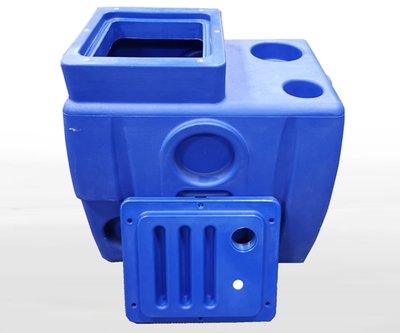Plastic is one of the most versatile and widely used materials in the world. It can be molded into any shape and size, and it can have different properties depending on its composition and processing. However, not all plastic manufacturing processes are created equal. Some are more expensive, time-consuming, or wasteful than others.

How do you know which one is best for your budget and project requirements?
In this article, we will compare and contrast the most common plastic manufacturing processes and help you make an informed decision.
3D Printing
3D printing is a process that creates plastic parts by depositing layers of material on top of each other, following a digital model. 3D printing is ideal for prototyping, customizing, and creating complex geometries that are difficult or impossible to make with other methods. 3D printing can use a variety of thermoplastic materials, such as ABS, PLA, nylon, PETG, TPU, etc.
Advantages:
- Low upfront cost and fast turnaround time
- High design flexibility and customization
- Minimal material waste and easy recycling
Disadvantages:
- Limited part size and strength
- High per-part cost and low production volume
- Post-processing required to improve surface finish and accuracy

CNC Machining
CNC machining is a process that uses computer-controlled machines to cut, drill, or mill plastic parts from solid blocks of material. CNC machining is ideal for producing high-precision parts with tight tolerances and smooth surfaces. CNC machining can use a variety of thermoplastic materials, such as acrylic, polycarbonate, POM, PEEK, etc.
Advantages:
- High accuracy and quality
- Wide range of material options and properties
- Suitable for both prototyping and production
Disadvantages:
- High upfront cost and long lead time
- High material waste and difficult recycling
- Limited design flexibility and complexity

Polymer Casting
Polymer casting is a process that uses liquid resin to fill a mold cavity and form a plastic part after curing. Polymer casting is ideal for producing large or hollow parts with intricate details and textures. Polymer casting can use a variety of thermosetting materials, such as epoxy, polyurethane, silicone, etc.
Advantages:
- Low upfront cost and moderate lead time
- High design flexibility and complexity
- Good surface finish and appearance
Disadvantages:
- Low accuracy and quality
- Limited material options and properties
- Difficult to recycle or reuse

Rotational Molding
Rotational molding, or rotomolding, is a process that uses heat and rotation to form hollow plastic parts from powdered resin. Rotomolding is ideal for producing large or complex parts with uniform wall thickness and high impact resistance. Rotomolding can use a variety of thermoplastic materials, such as polyethylene, polypropylene, PVC, nylon, etc.
Advantages:
- Low upfront cost and moderate lead time
- High design flexibility and complexity
- No material waste and easy recycling
Disadvantages:
- Low accuracy and quality
- Limited material options and properties
- Long cycle time and low production volume

Vacuum Forming
Vacuum forming is a process that uses heat and vacuum to shape plastic sheets over a mold. Vacuum forming is ideal for producing thin-walled parts with simple shapes and fine details. Vacuum forming can use a variety of thermoplastic materials, such as acrylic, polystyrene, ABS, PETG, etc.
Advantages:
- Low upfront cost and fast turnaround time
- Good surface finish and appearance
- Suitable for both prototyping and production
Disadvantages:
- Limited design flexibility and complexity
- High material waste and difficult recycling
- Poor dimensional stability and strength

Injection Molding
Injection molding is a process that uses high pressure and heat to inject molten plastic into a mold cavity. Injection molding is ideal for producing high-volume parts with high precision and quality. Injection molding can use a variety of thermoplastic materials, such as polyurethane, polycarbonate, POM, PEEK, etc.
Advantages:
- High accuracy and quality
- Wide range of material options and properties
- High production volume and low per-part cost
Disadvantages:
- High upfront cost and long lead time
- High material waste and difficult recycling
- Limited design flexibility and complexity

Extrusion Blow Molding
Extrusion blow molding is a process that combines extrusion and blow molding to form hollow plastic parts. Extrusion blow molding is ideal for producing bottles, containers, ducts, pipes, etc. Extrusion blow molding can use a variety of thermoplastic materials, such as polyethylene, polypropylene, PVC, PET, etc.
Advantages:
- Low upfront cost and moderate lead time
- High production volume and low per-part cost
- Good surface finish and appearance
Disadvantages:
- Low accuracy and quality
- Limited material options and properties
- Limited design flexibility and complexity

Read the article here, and you also know that there are no easy solutions to custom plastic fabrication. Each plastic process has different advantages and disadvantages, depending on your budget and project requirements. To choose the best plastic manufacturing process for your product, you need to consider factors such as shape, volume/cost, lead time, material, and more.
If you are interested in using the plastic manufacturing process or would like more information, please do not hesitate to contact us. We are a source manufacturer specialising in the custom processing and production of engineered plastic materials and high temperature plastic materials. With our team of professional engineers and sophisticated equipment, we are happy to be disturbed and help you with your needs. Do you need a free quote or help with any questions or materials?
Our website: www.beeplastic.com
Click to contact: plastic manufacturing process







